6th Jewish Culture Days Adloyada will be dedicated to memory. Exhibitions, discussions, shows, concerts, lectures, workshops and presentations will refer to the meaning of individual memory and the role of the collective one in building and maintaining local and regional identity. Among our guests there will be, among others, Kazimierz Barczuk, Rev. Andrzej Draguła, Sebastian Duda, Leszek Dulik, Grzegorz Fedorowski, Daniel Kalinowski, Jakub Kornhauser, Joanna Lisek, Artur Daniel Liskowacki, Magdalena Palica, Piotr Piluk, Teresa Śmiechowska, Artur Tanikowski, Magdalena Tarnowska, Piotr Weiser, Gniewomir Zajączkowski and Konrad Zieliński.
During the festival we are going to discuss contemporary concepts of memory as understood by literature, philosophy and art (memory and de-remembering, trauma and memory, memory and post-memory, memory and history; space and memory; ritual and memory, objects and memory etc.). The participants of particular festival meetings will also take the subjects that are of basic meaning for understanding urban space (monuments as carriers of collective memory and signs of symbolic violence; necropolis and cemeteries as places of memory of people and region).
During Adloyada a concert of LIBELID will take place, which is a presentation of a series of song of love in Yiddish, arranged by Ola Bilińska accompanied by a band of experienced musicians from Gdańsk, Warsaw and Sejny. The compositions included in the LIBELID programme are a choice of pre-war songs which are a record of memory of Jewish customs. The musical aim of the project is to combine subtle acoustic and electronic sounds.
The programme includes also a vernissage “The Lost World. Polish Jews. Photographs of Years 1918-1939”. Leszek Dulik has chosen several hundreds of photographs from among thousands of them. They are accompanied by cultural and historic background written by Konrad Zieliński. The works have been made by renown and outstanding photographers and by those whose names remain unknown. They show large cities and small towns, where the majorities of citizens were often Jews. In these societies, like among Jewish inhabitants of villages, traditional forms of lives survived for unchanged for centuries, carefully maintained. The pictures show also assimilated Jews, who were brought up in Polish schools and strongly bound to Polish history, culture and language. These pictures allow to maintain the remembrance of the lost world.
Throughout the whole March Secesja Café will serve a special menu of Jewish cuisine.
Teatr Mały (6 Księcia Bogusława X St.), The National Museum in Szczecin – The Dialogue Centre Upheavals (1 Plac Solidarności Sq.), The National Museum in Szczecin (3 Wały Chrobrego St.), The Rectorate of The University of Szczecin (22a Papieża Jana Pawła II Av.), Secesja Café (19/1 Papieża Jana Pawła II Av.), The Library of The University of Szczecin (40 b Piastów Av.), The National Museum in Szczecin – The Museum of Regional Traditions (27 Staromłyńska St.), The Contemporary Theatre in Szczecin (3 Wały Chrobrego St.), “Słowianin” Community Centre (7 Korzeniowskiego St.)
Entrance information: free except for the show (PLN 12)
Museum opening hours:
Tuesday, Wednesday, Saturday 10.00 A.M. – 6.00 P.M.
Thursday 10.00 A.M. – 8.00 P.M.
Sunday 10.00 A.M. – 4.00 P.M.
Monday, Friday – closed
Curator: Dr. Beata Małgorzata Wolska
Organizer: The National Museum in Szczecin, Faculty of Philology – The University of Szczecin, Faculty of Humanities – The University of Szczecin, Secesja Café, Polish Authobiographic Society
Co-Organizer: “Słowianin” Community Centre, FiKa, The Contemporary Theatre in Szczecin, Emanuel Ringelblum Jewish Historical Institute
Partners: Boni Libri Publishing Leszek Dulik, Grodzka Gate – NN Theatre, Museum of the History of Polish Jews POLIN, Pietrucha, “Słowo Żydowskie”, Social-Cultural Society of Jews in Poland, “Więź”, WBPiCAK Publishing
